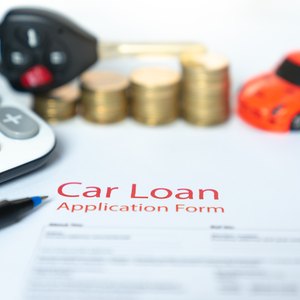
Kelley Blue Book lists the average price of a new midsize car at $25,000. Even late-model used cars can cost thousands of dollars. That can make buying a car too expensive for many people to pay cash. Often offering a lower interest rate than a credit card or a personal loan, with zero percent financing through a dealership for many qualified buyers, a car loan can help make buying a new or used car affordable for more people.
Why Should You Get an Auto Loan?
Just as most people wouldn’t buy a house with cash, taking out an auto loan enables you to buy a better new car than you might otherwise be able to afford upfront. That doesn’t mean you should overextend yourself with a higher monthly payment than your budget permits. But not everyone can walk into a car dealership and process a $20,000 debit card transaction or write a check for a new car. A monthly payment of $200 to $500, or even less, fits better into most people’s financial plans.
Even if you could pay for a new car in cash, it might not make financial sense. With many banks offering generous annual percentage rates (APRs) in savings and money market accounts, you can keep your money in the bank earning interest for you.
If you have a good credit score, you should be able to secure zero-percent financing from your car dealership, leading to low monthly payments for a vehicle you love.
You can achieve even lower monthly payments with a longer loan term or by making a larger down payment – or both.
Why Borrowing Money to Buy a New Car Might Pay
When you factor in the cost of unexpected auto repairs and maintenance on an older vehicle, not to mention the stress that comes with worrying about breaking down, buying a new car starts to seem like the wiser choice.
A study from Consumer Reports found the annual repairs of a three-year-old Toyota equal only $50. A 10-year-old model, on the other hand, costs an average of $420 per year in repairs.
Higher-end vehicles, according to the report, cost even more to repair over time, with a 10-year-old Audi costing its owner an average of $955 for the year, versus $165 for a three-year-old model.
Plus, when you upgrade to a newer model, you’ll gain the advantage of numerous safety features, which could reduce your monthly car insurance payments.
Getting a car loan has a few other benefits, too. When you make your car payment on time, it shows up on your credit report and improves your credit score. If you haven’t had a car loan before, you’ll also diversify your credit history, which is one of the factors used to determine your credit score.
Auto financing typically carries a lower annual percentage rate (APR) than either a personal loan or a credit card because it is a secured loan. If you don’t make your monthly payments on time, the lender can repossess your vehicle and sell it at auction, often making up for the money they lost on the loan. That’s one way dealerships and other lenders can afford to offer low auto financing rates.
Read More: How to Calculate Compound Interest on a Car Loan
Car Financing Options: Banks, Credit Unions, Car Dealerships
You don’t have to rely on your car dealership for auto financing, although many people do. Going directly to your car dealer often means you can “sign and drive,” meaning you’ll get approved for financing, transfer your car insurance to your new vehicle and be able to take your vehicle home that day.
However, you can often find better rates, especially if you have bad credit or a short credit history, through another financial institution, such as a bank or credit union.
Before you commit to car financing with your dealer, make a few calls to check the interest rate with local lenders. Sometimes, if you have an account with a bank or credit union, they will offer you a better deal since you are a loyal customer.
How to Apply for a Car Loan
Applying for a car loan is similar to applying for a credit card or personal loan. Although, if you have poor-to-fair credit or are self-employed, the steps may be similar to applying for a mortgage. Different financial institutions have different lending requirements.
When you apply for a car loan, be prepared with the following information:
- Government-issued photo ID showing your legal name
- Proof of residence (You may need to list your past three addresses if you haven’t been in your current home for 10 years)
- Social Security number
- Proof of income (Tax forms, pay stubs, W-2 forms or 1099 forms if self-employed)
- Vehicle Identification Number, make, model and year
- Proof of current insurance
- Down payment (in the form of cash, check, credit or debit card)
Your lender will likely check your credit history by running a credit report. Some lenders will want to see other proof of financial stability, such as recent bank statements or other mortgage and loan payments with an up-to-date payment history.
If you are self-employed or own a business, be prepared to show two years of business and personal tax returns to prove your income.
Read more: How to Get W2 Forms from a Former Employer
To see if you qualify for the loan and determine your interest rate, the lender will look at a number of factors, including:
- Income
- Debt-to-income ratio
- Credit score
- Credit history
- Job history
Some lenders provide loans to anyone who can show they are gainfully employed, but these loans often carry higher interest rates.
Read more: Getting Approved After a Repossession
How to Get the Best Interest Rate on Your Auto Loan
Securing the best interest rate for a car loan involves shopping around with multiple financial institutions. But because your credit history also affects the offers you’ll receive, you want to make sure your finances are in order first.
Request copies of your credit reports from the major credit bureaus, Equifax, Experian and TransUnion. Look for any errors that you can fix by writing a letter to the bureau, such as bills that were paid on time but mistakenly marked as late or errors in your name, addresses or places of business.
In the months leading up to shopping for a car loan, pay down as much of your credit card debt as you can to improve your debt-to-available-credit ratio, while maintaining your emergency savings account if possible.
Remember, if you have a trade-in vehicle, that money can be applied to your new car purchase, reducing the loan amount. If you decide to sell your used car privately, you can apply that money to the down payment on the new vehicle.
What to Do If You Don’t Qualify for an Auto Loan The First Time
If you don’t qualify for a car loan the first time or the interest rate is too high, consider making a larger down payment. You may also be able to secure a better interest rate with a longer loan term, since the lender will look at your overall monthly payments. If you pay the car back over a longer time frame, you will have lower monthly payments, even though you’ll pay more in interest over the life of the loan. You can always pay back your car loan faster by putting a little bit extra toward the bill each month. Most auto loans have no pre-payment penalties if you pay the money back before the loan matures.
You may also be able to secure better auto financing by applying with a co-signer to the loan. A co-signer guarantees to pay back the loan if you are unable to make the payments. Your monthly payments also affect your co-signer’s credit history and credit score. If you make the payments on time, it benefits your co-signer, but if you don’t, they can lose points on their credit score.
Refinance Your Car Loan for Better Rates
People’s financial circumstances often change. You may get a better, higher-paying job or you might have paid down credit card debt to improve your credit score. You may even get a windfall of money that puts you in a better spot financially.
Many people don’t know that you can refinance your auto loan for a lower interest rate. Sometimes, a better APR comes along shortly after you purchase the vehicle and refinancing makes sense even if your finances, credit score or credit history haven’t changed much.
Read more: What Does Refinance Your Car Mean?
Refinancing a car is easier than refinancing a house, with no closing costs.
Whether you’re taking out your first car loan, refinancing a vehicle or trading in an older vehicle for a new car and paying the balance with a loan, understanding the process can help you get the best deal for your money.
References
Writer Bio
Dawn Allcot is a full-time freelance writer, content strategist, and founder of GeekTravelGuide.net, a travel, technology, and entertainment website. A seasoned finance writer, her work has appeared on Forbes, Bankrate, Lending Tree, Solvable, Moneycrashers, and many other personal finance sites, including the award-winning Chase News & Stories portal. With more than 20 years editorial experience, Dawn seeks to take complex concepts and simplify them for today's busy readers. Whether she is writing about taxes or technology, her goal is always to educate, inform, and entertain.

